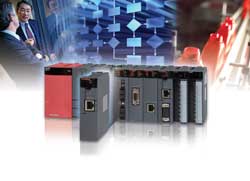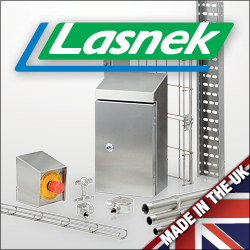
Posted to News on 15th Jun 2007, 08:37
New module for iQ automation controller cuts cost of MES
Mitsubishi is introducing the iQ Platform, which builds on the power of the company's Qn series programmable automation controller (PAC) with a range of control modules that interface directly with business information systems to deliver true top-to-bottom plant and enterprise control. While similar functionality can be achieved with systems from other suppliers, Mitsubishi believes its iQ platform is significantly more cost-effective.

The iQ Platform achieves simple, effective integration of plant and business functions, from the shop floor to corporate commercial systems. Modular hardware allows control engineers to configure complete systems without the need to involve IT specialists. Jeff Whiting, Mitsubishi's commercial communications manager, states: "This is a major move forward in the industry - and a major move forward in pricing."
Adaptable and powerful, the iQ platform enables companies to take a strategic approach to automation and control, giving full integration of all business functions. The benefits include greater efficiencies in all aspects of the organisation, leading to significant cost savings.
Improving operational efficiency
The ability to monitor and control automation processes across many different functions within a business is key to achieving greater operational efficiency. This allows companies to respond effectively to sales and market trends, improve profits, and reduce waste, rework, maintenance and spares holdings.
Mitsubishi describes the iQ Platform as a high-performance system that enables open communication between factory equipment and business processes. It uses common systems, protocols and networks to bring these functions together. This can be achieved using either a single communications network or, alternatively, through the integration of existing networks within the organisation.
The iQ Platform strategy revolves around the Qn series of PACs, coupled with powerful extensions and modules designed to sit at the heart of plant processes. This enables total integration of control and communications from a single hardware platform. The control platform is highly scalable, being capable of accommodating anything from just a handful of I/O channels right up to several thousand. It can monitor or map all channels concurrently, which means that business functions can be integrated more effectively.
Advanced hardware and software tools also deliver comprehensive production data management as part of the iQ platform strategy. This provides a novel means of connecting data from the shop floor control systems to the management IT databases feeding the control and reporting systems. The MES connectivity makes it easy to track, measure and control critical production data and activities, providing information such as increased traceability, productivity and quality improvement.
Scalable platform
Importantly, in devising the strategy for MES connectivity, Mitsubishi has recognised that MES systems vary greatly in scope and scale, from simple work-in-progress reporting right through to full end-to-end manufacturing control and monitoring. The iQ Platform is scalable to meet the requirements of all of these approaches.
Based on industrial PLC design standards, the MES module removes the need for any intermediate PC interface and associated specialist software - which effectively eliminates an entire layer in the IT system architecture. This significantly reduces development costs through ease of installation, as control engineers can integrate data directly into and from the management databases. The inclusion of the MES module in a system removes the requirement for specialist IT database skills in the integration process.
In developing the iQ platform, Mitsubishi has recognised that the ability to respond to changing market conditions and customer requirements is vital in today's fast-moving business world. The lifeblood of business in this challenging environment is information, which holds the key to yielding greater efficiency and more flexible processes. With the iQ platform, Mitsubishi has delivered an intelligent automation strategy that enables simple integration of the world's most advanced shop floor automation controllers with powerful management reporting and execution systems.
Integration with other systems
Mitsubishi's versatile iQ platform is compatible with most major industrial fieldbus protocols.
To make the most of the MES module, Mitsubishi offers the MX4-Business server software, which is easy to configure (there is no need to write any scripts) and enables the data from the MES module to be shared concurrently with up to 32 databases. MX4-Business is based on OEE Impact from GEMBA Solutions and the software integrates with most ERP systems and databases.
If customers wish to integrate the iQ platform's MES functionality with third-party automation control systems, Mitsubishi can supply its GOT (graphic operator terminal) range of HMIs with an MES module.
Business benefits
A number of Mitsubishi's customers have already used the iQ platform, MES module and MX4-Business software to good effect. In one case it is claimed that 400 per cent payback was achieved in 12 months, while another customer says that payback was achieved in three months and production could be changed form a three-shift system to a two-shift system. Another customer says the system saved £30,000 in the first two months alone.


















